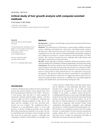 9 citations,
May 2020 in “Journal of Pharmaceutical and Biomedical Analysis”
9 citations,
May 2020 in “Journal of Pharmaceutical and Biomedical Analysis” Method measures latanoprost and minoxidil in skin accurately and precisely.
 2 citations,
November 2015 in “Journal of Investigative Dermatology Symposium Proceedings”
2 citations,
November 2015 in “Journal of Investigative Dermatology Symposium Proceedings” A standard protocol for alopecia areata clinical trials was created to improve consistency and encourage more research.
 8 citations,
August 2019 in “Journal of The American Academy of Dermatology”
8 citations,
August 2019 in “Journal of The American Academy of Dermatology” Early diagnosis and treatment, like topical minoxidil, can prevent hair loss in children.
 2 citations,
March 2020 in “International Journal of Molecular Sciences”
2 citations,
March 2020 in “International Journal of Molecular Sciences” Topical treatments can deliver active molecules to skin stem cells, potentially helping treat skin and hair disorders, including skin cancers and hair loss.
 January 2017 in “Journal of Investigative Dermatology Symposium Proceedings”
January 2017 in “Journal of Investigative Dermatology Symposium Proceedings” The 2015 Hair Research Congress concluded that stem cells, maraviroc, and simvastatin could potentially treat Alopecia Areata, topical minoxidil, finasteride, and steroids could treat Frontal Fibrosing Alopecia, and PTGDR2 antagonists could also treat alopecia. They also found that low-level light therapy could help with hair loss, a robotic device could assist in hair extraction, and nutrition could aid hair growth. They suggested that Alopecia Areata is an inflammatory disorder, not a single disease, indicating a need for personalized treatments.
 11 citations,
January 2001 in “Cambridge University Press eBooks”
11 citations,
January 2001 in “Cambridge University Press eBooks” Androgens can cause hair growth in some areas but hair loss on the scalp.
 2 citations,
December 1997 in “Journal of The American Academy of Dermatology”
2 citations,
December 1997 in “Journal of The American Academy of Dermatology” The document concludes that doctors should monitor children's brain development when treating hemangiomas with interferon alfa and consider stopping the treatment if problems arise, while also exploring drugs that might counteract side effects.
1 citations,
February 2017 in “PubMed” The supplement may help hair growth and is safe, but more research is needed.
 25 citations,
June 2018 in “Clinical and Experimental Dermatology”
25 citations,
June 2018 in “Clinical and Experimental Dermatology” Combined microneedling and minoxidil improves hair growth more than minoxidil alone.
 1 citations,
May 2017 in “InTech eBooks”
1 citations,
May 2017 in “InTech eBooks” The document concludes that alopecia areata is an unpredictable autoimmune hair loss condition with no cure, but various treatments exist that require personalized approaches.
 January 2018 in “Sohag Medical Journal”
January 2018 in “Sohag Medical Journal” Combining topical dutasteride with microneedling is more effective for hair growth than microneedling alone.
 11 citations,
November 2021 in “Clinical, Cosmetic and Investigational Dermatology”
11 citations,
November 2021 in “Clinical, Cosmetic and Investigational Dermatology” Resveratrol may help hair grow, but more research is needed.

Ostrich antibodies can help restore hair growth in people with a specific type of hair loss, increasing hair count by 71% on average.
 1 citations,
August 2024 in “Pharmaceuticals”
1 citations,
August 2024 in “Pharmaceuticals” Goat placenta extract in a special delivery system improved hair growth and thickness in chemotherapy patients.
 August 2023 in “Stem Cell Research & Therapy”
August 2023 in “Stem Cell Research & Therapy” A substance called Cell-free fat extract can effectively treat common hair loss by increasing hair growth and density.
 November 2023 in “Journal of Cosmetic Dermatology”
November 2023 in “Journal of Cosmetic Dermatology” Tofacitinib is effective and has minor, reversible side effects for treating severe hair loss in Iran.
May 2024 in “Molecules/Molecules online/Molecules annual” Plant extracts can help prevent hair loss and promote hair growth.
 November 2022 in “Cosmetics”
November 2022 in “Cosmetics” Red pigmented rice, like Sang-Yod rice, could help promote hair growth and prevent hair loss.
 January 2019 in “Journal of Dermatology and Venereology”
January 2019 in “Journal of Dermatology and Venereology” Sesame and pumpkin seed oil can effectively regrow hair in alopecia areata.
September 2022 in “Applied sciences” Combining micro-needling, LED therapy, and growth factors with Finasteride® significantly improves hair growth.
 1 citations,
May 2022 in “Pharmaceutics”
1 citations,
May 2022 in “Pharmaceutics” Tea seed oil in nanostructured carriers stimulates hair growth and feels less greasy when applied.
 40 citations,
April 2006 in “Journal of the European Academy of Dermatology and Venereology”
40 citations,
April 2006 in “Journal of the European Academy of Dermatology and Venereology” The Trichoscan system was found to be inaccurate for measuring hair growth, needing better software to be useful.
 5 citations,
January 2019 in “Clinical Drug Investigation”
5 citations,
January 2019 in “Clinical Drug Investigation” Some off-label treatments increase hair density, but long-term safety unknown.
 July 2024 in “Skin Research and Technology”
July 2024 in “Skin Research and Technology” The products significantly promote hair growth and maintain hair bulb health.
 47 citations,
April 2016 in “Lasers in Surgery and Medicine”
47 citations,
April 2016 in “Lasers in Surgery and Medicine” Low-level laser therapy may improve hair regrowth and thickness for androgenetic alopecia, but more research is needed.
August 2024 in “Nutrients” Probiotics help reduce hair loss and increase hair growth in people with androgenic alopecia.
 41 citations,
January 2020 in “BioMed Research International”
41 citations,
January 2020 in “BioMed Research International” Micrografts improve hair density and thickness without side effects.
 5 citations,
February 2011 in “Expert Opinion on Drug Discovery”
5 citations,
February 2011 in “Expert Opinion on Drug Discovery” We need better treatments for hair loss, and while test-tube methods are helpful, they can't fully replace animal tests for evaluating new hair growth treatments.
 October 2024 in “Journal of Advanced Pharmaceutical Technology amp Research”
October 2024 in “Journal of Advanced Pharmaceutical Technology amp Research” Trigonelline nanocrystal cream effectively promotes hair growth and may reduce side effects.
August 2022 in “Nutrients” Nutritional supplements may help improve hair growth in female pattern hair loss.

























